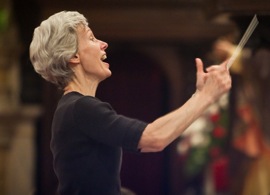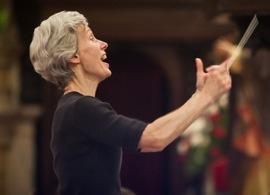The Mission Chamber Orchestra of San José kicks off this year’s Portuguese pride festivities in the Bay with its 5th annual Music of Portugal concert. Coinciding with Portugal Day — a Portuguese national holiday marking the death of famed poet Luís de Camões — the orchestra features two relatively unknown classical composers, whose music was suppressed by Portuguese Prime Minister António de Oliveira Salazar, and showcases the enclave’s rich musical tradition.

“The problem with Portuguese [classical] music is that Portugal was under a dictator for a really long time and he had most of the music put away, locked away in vaults basically, so it wasn't published for the most part,” said Music Director and Conductor Emily Ray. “This is why a lot of people aren't even aware of it because it never got published and it sat in these vaults for years and years.”
The concert was sparked by a local pastor with access to Portuguese classical music recordings. He gave Ray the recordings and put her in contact with the Portugal Day committee. With funding from the Instituto Camões and some more music from the Calouste Gulbenkian Foundation, the orchestra was able to obtain original, and at times handwritten, sheet music. “A lot of this music that we get is handwritten still, never been printed. Some of it's been really difficult to read,” Ray laughed. “Sometimes my players go, 'Oh, not the Portuguese music again!' It's a little hard to read but the [music] we got this year is actually pretty easy to read.”
Although this genre of classical music does not dominate the airwaves, Portuguese music is in no way a lost art. According to Manuel Bettencourt, committee chair for Portugal Day, Portuguese folk music is alive and well amidst a Portuguese population somewhere between 40,000 and 50,000 people in San José and a half million in California.
“The musical Portuguese community is pretty visible. The musical community in the Bay area has several marching bands and folklore groups. Just in San José, there are three Portuguese marching bands of walking distance from one another,” said Bettencourt. “It is not classical music. [But] it is one of the reasons that we are involved with the concerts, to promote the Portuguese classical music, as well as the Portuguese composers.”
Ray and her orchestra will perform three Portuguese songs — Nocturno by António Fragoso, Symphony No. 2 by Luís de Freitas Branco, and a classical twist on a folk song called Olhos Negros.
But what does Portuguese classical music sound like anyway?
As Freitas Branco studied with German composer Engelbert Humperdinck (Hänsel und Gretel, the opera), the first piece is written with a 19th-century flair and in standard four movement symphonic form – allegro, adagio, minuet, allegro again, or sonata. However, the piece includes dissonant harmonies associated with 20th-century music (think Ravel rather than Tchaikovsky).
Fragoso, who died at age 21, wrote a short (by orchestral terms) lyrical nocturne reminiscent of Wagner, lasting about seven minutes. The traditional song, which originally only had music for piano and voice, was arranged by Ray and will be sung by Portuguese soprano Elizabeth Medeiros Hogue.
Music of Portugal will take place at Five Wounds Portuguese National Church in San José on June 5.
Regardless of whether the music is folk or classical, June is sure to be a month that will bring the Mission Chamber Orchestra of San José and the Portuguese community closer together with each passing year.
“Music creates a bond and folklore traditions keep the connection between the generations and even Portugal,” said organizer and supporter Filomena Goulart. “The days of just sitting around playing music after dinner are all but gone but I suppose that at some point the pendulum has to swing the other way, hopefully.”

